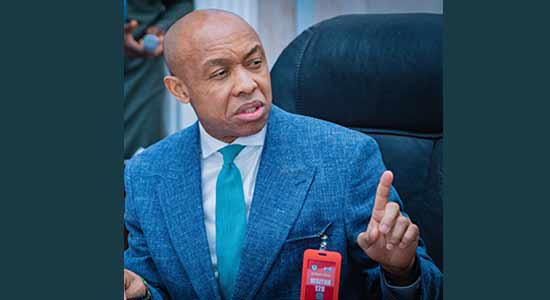The judiciary,…. has no influence over either the sword or the purse; no direction either of the strength or of the wealth of the society; and can take no active resolution whatever. It may truly be said to have neither force nor will, but merely judgment.
Alexander Hamilton, The Federalist, No. 78
In January 1983, a suspicious fire incident did considerable damage to NECOM House, the high-rise building in Lagos that housed the headquarters of the country’s telecommunications monopoly, then known as the Nigerian Telecommunications Limited, NITEL. Alhaji Shehu Shagari was in power as elected civilian president. The belief was widespread that the fire was the handiwork of “senior officials in the building (who) had been under investigation for fraud and embezzlement that police estimated at more than $100 million.”
The NECOM House fire was another in a succession of high-profile incidents with a whiff of arson affecting public infrastructure in the country. The previous month, another fire had consumed the Ministry of External Affairs, reportedly “set by accountants who were under investigation.”
Casualty count from the NECOM House fire incident was substantial but uncertain. By some coincidence, the fire occurred the week after the fire-fighting team at the facility had been inexplicably withdrawn.
The response of the federal authorities was even more inexplicable. The 21 persons whom they chose to prosecute in connection with the incident included Ray Ekpu, at the time a senior journalist and columnist, whose crime appeared to be that he published an article after the incident suggesting that it was arson.
Also charged were Adamu Akokhia, Chief Fire Officer of the Federation; and Saidu Garba, the Divisional Fire Officer responsible for the building. While they were suspects in pending criminal proceedings, the federal authorities also suspended Adamu Akokhia and Saidu Garba from work.
Saidu Garba sued at the High Court of Lagos State challenging his suspension. While his case was still pending, the Permanent Secretary in the Ministry of Internal Affairs, John Oyegun, issued a letter sacking him from the public service.
Informed of this development, the presiding judge, Yahaya Jinadu, summoned John Oyegun to appear before him and explain why he should not be held in contempt of court. The judge subsequently found Mr. Oyegun guilty of contempt, cautioned him and required him to withdraw the letter of termination issued to Saidu Garba while his case was pending.
Despite the forbearance of the court, Mr. Oyegun failed to comply. On 3 August 1984, the court ordered his lawyer to secure compliance by his client with the order or cease participation in the proceedings until he complied. By this time, Major-General Muhammadu Buhari was in his eighth month in power as military ruler, having overthrown Shagari.
Five days later, on 8 August, then Chief Judge of Lagos State, Adetunji Adefarasin, summarily withdrew the case file from Yahaya Jinadu and reassigned it to himself, claiming that he did so at the request of the trial judge. Yahaya Jinadu denied ever having made such a request to the Chief Judge.
While Yahaya Jinadu was on pilgrimage to Mecca shortly thereafter, the Advisory Judicial Committee (AJC), then chaired by Chief Justice Sodeinde Sowemimo (the same one who infamously convicted Obafemi Awolowo two decades earlier), constituted a committee “that curiously condemned his actions and asked him to make written and verbal apologies” to, among others, the federal attorney-general, the President of the Court of Appeal, and the Chief Judge of Lagos State. Unwilling to abide an order which he characterised as “humiliation and disgrace of the judiciary”, Yahaya Jinadu served the statutory sixty-day notice of his intention to resign as a judge. In response, the regime terminated his judicial career summarily.
For being acutely aware of the duty to conserve the currency of judicial authority and being prepared to defend that, Yahaya Jinadu paid a heavy price with his career. Those who traduced him set in motion a deadly corrosion of judicial authority whose inter-generational consequences today endanger the very foundations of both the institution and the country.
Two contemporaneous events this past week dramatized how badly so. Addressing judges at the beginning of the week at a continuing judicial education event in Abuja, the Federal Capital, Chief Justice of the Federation, Kudirat Kekere-Ekun, complained about deepening public distrust of the judiciary, reminding her colleagues that “it is not enough to be impartial; we must also be seen to be impartial. The perception of bias or impropriety can be as damaging as the reality itself.”
At about the same time as the Chief Justice uttered them, these sentiments were on trial at another end of town. The Federal High Court in Abuja was the venue of the now viral contretemps between Nnamdi Kanu, self-proclaimed leader of the Indigenous People of Biafra (IPoB), on the one hand; and the presiding judge, the lead prosecutor, and even his own team of lawyers, on the other. If anything was more troubling than the conduct of Mr. Kanu in that outing, it was the self-inflicted lack of judicial authority to firmly put a stop to it.
To be sure, there are ample provisions in the Administration of Criminal Justice Act (ACJA) empowering courts to preserve their authority or act against the disruption of their proceedings. A judge for a quarter of a century and a state attorney-general before that, the one charge that cannot possibly be made against the presiding judge in this case is inexperience. So, why was the court, nevertheless, so craven?
On 24 September 2024, she had ruled in respect of the same proceedings concerning Mr. Kanu that: “The root of adjudication is confidence. The defendant has no confidence in this court. Consequently, I hereby recuse myself from this trial and hereby remit the case file to the Chief Judge for further necessary action.” Three weeks later, it was reported that the Chief Judge decided administratively to overrule the trial judge’s recusal and return the case file to her.
There are, however, two problems with this decision. First, as a matter of law, the Chief Judge may be a first among his peers but he is no paramount chief at large. His powers do not extend to administratively overruling a written decision of a judge sitting as such. Second, as a practical matter, a judge who by her own hand rules to recuse herself from proceedings after affirming cratered confidence in her handling of the proceedings cannot allow herself to be bullied or inveigled into attempting to ingest her judicial vomit.
The coincidence of these two developments almost assuredly denied the court of its constitutive authority, making it a passenger in that piece of execrable judicial theatre.
The standard under the 1999 constitution is that a court shall be constituted “in such a manner as to secure its independence and impartiality.” A judge cannot return to claim impartiality and independence after having gone on record to recuse herself for having lost the confidence of the defendant. A forum in that setting hardly deserves the appellation of a court.
Nigeria’s 1999 constitution speaks loosely of “judicial power”. The traditional tools of power in this sense are coercive or transactional. As a fact, the judiciary lacks both. Its currency is neither arms nor money. Rather it is reason and authority.
To the extent that it is possible to salvage anything from the wreckage of those proceedings in that Federal High Court last week, it is the importance of holding the feet of the judiciary to fire when any judge – no matter how high – acts in a manner that casually endangers that authority. The costs of not doing so are incalculable.
A lawyer and teacher, Odinkalu can be reached chidi.odinkalu@tufts.edu










